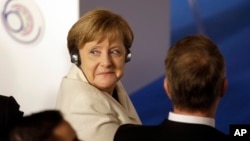A state election Sunday in western Germany offers Chancellor Angela Merkel’s conservatives a tough test against their resurgent center-left rivals six months before Merkel seeks a fourth term in a national vote.
The election for the state legislature in Saarland, a region of just less than 1 million people on the French border that Merkel’s Christian Democrats have led since 1999, is the first of three regional votes before Germany’s September 24 national vote.
Test for Merkel, Schulz
It’s being watched closely as the first electoral test since the center-left Social Democrats nominated Martin Schulz as Merkel’s challenger in January.
Schulz, a former president of the European Parliament but a newcomer to national politics, has boosted his party’s long-moribund poll ratings and injected it with new self-confidence. He’s offering a classic though often vague center-left pitch of tackling economic inequality at home.
That boost means that a fourth Merkel term no longer looks inevitable — and it also has tightened the race in Saarland.
Conservative governor Annegret Kramp-Karrenbauer until recently looked certain to win a new five-year term. But Social Democrat rival Anke Rehlinger now hopes to finish first, and polls suggest she could win a majority for an alliance with the opposition Left Party.
The two women currently govern together in a “grand coalition” of the biggest parties, an alliance similar to Merkel’s at the national level.
Governor's race important
Kramp-Karrenbauer is one of only five conservative governors in Germany’s 16 states. Losing her would be a worrying signal for the national campaign and for two bigger state elections in May — in Schleswig-Holstein and Germany’s most populous state, North Rhine-Westphalia, both led by the Social Democrats.
Merkel has barely mentioned Schulz so far, but warned at a rally in Saarland on Thursday against a left-wing coalition there.
“We don’t want the clocks to go back on Sunday; we want the clocks to be put forward,” she said.




